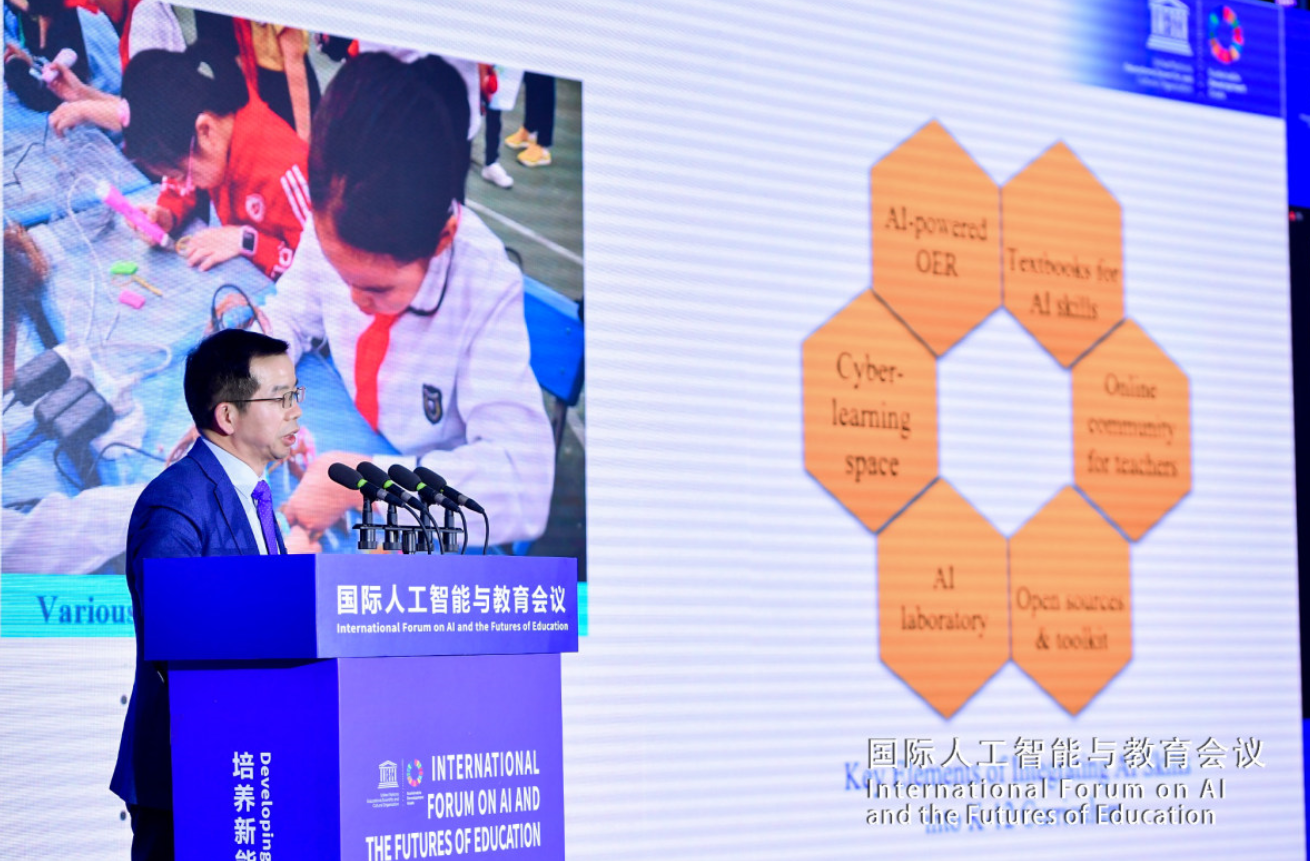Dean Huang attended the "2020 International Conference on AI and the Futures of Education " and delivered a speech
date:2020-12-09 16:10author:小编source:Smart Learning Instituteviews:
From December 7th to 8th, the "2020 International Conference on AI and the Futures of Education " co-sponsored by UNESCO, the Chinese Ministry of Education, and the Chinese National Committee for UNESCO will be held through online and offline integration. The offline venue is located in Beijing Normal University.
With the theme of "Cultivating New Ability to Meet the Intelligent Era", this conference explored the core qualities that humans need to possess in the intelligent era, and studied future education development strategies and ways of educating people. Agapito Mba Mokuy, Chairperson of the UNESCO Executive Board, and Stefania Giannini, Assistant Director-General for Education of UNESCO delivered online speeches. Chen Baosheng, Chinese Minister of Education and Dong Qi ,President of Beijing Normal University attended the offline meeting. Ministers of Education, heads of education administration departments, experts, scholars, and business leaders from Slovenia and the UAE attended the meeting. Minister Chen Baosheng introduced the practice, exploration and prospects of the Chinese government in fully implementing the 2030 Education Agenda and accelerating the modernization of education.
Dean Huang served as the on-site convener and guest speaker of the parallel conference "Ethical and Effective Artificial Intelligence Teaching Application" of the International Conference on Artificial Intelligence and Education, and delivered a speech on the topic of " Governance and Approaches of Infusing Artificial Intelligence into Education".
With the theme of "Cultivating New Ability to Meet the Intelligent Era", this conference explored the core qualities that humans need to possess in the intelligent era, and studied future education development strategies and ways of educating people. Agapito Mba Mokuy, Chairperson of the UNESCO Executive Board, and Stefania Giannini, Assistant Director-General for Education of UNESCO delivered online speeches. Chen Baosheng, Chinese Minister of Education and Dong Qi ,President of Beijing Normal University attended the offline meeting. Ministers of Education, heads of education administration departments, experts, scholars, and business leaders from Slovenia and the UAE attended the meeting. Minister Chen Baosheng introduced the practice, exploration and prospects of the Chinese government in fully implementing the 2030 Education Agenda and accelerating the modernization of education.
Dean Huang served as the on-site convener and guest speaker of the parallel conference "Ethical and Effective Artificial Intelligence Teaching Application" of the International Conference on Artificial Intelligence and Education, and delivered a speech on the topic of " Governance and Approaches of Infusing Artificial Intelligence into Education".

Dean Huang explained the governance and approaches of infusing artificial intelligence into education from four perspectives: Equipping Campus with Digital Technology as smart environments , Promoting students’ digital competency for the future , Improving teacher professional development through AI, Optimizing AI in Education with Education-Social Experiments (ESE). And put forward a healthy and sustainable development of education artificial intelligence governance framework:
1. Regulating Information Literacy Improvement of teachers and students in a sustainable developing and orderly manner;
2. Establishing a mechanism of campus admittance for AI products;
3. Developing the Social Experiments of AI and big data into education;
4. Identifying and defining the typical application scenarios of AI in education;
5. Ensure students' Privacy Protection and Data Security while using AI products.
1. Regulating Information Literacy Improvement of teachers and students in a sustainable developing and orderly manner;
2. Establishing a mechanism of campus admittance for AI products;
3. Developing the Social Experiments of AI and big data into education;
4. Identifying and defining the typical application scenarios of AI in education;
5. Ensure students' Privacy Protection and Data Security while using AI products.

